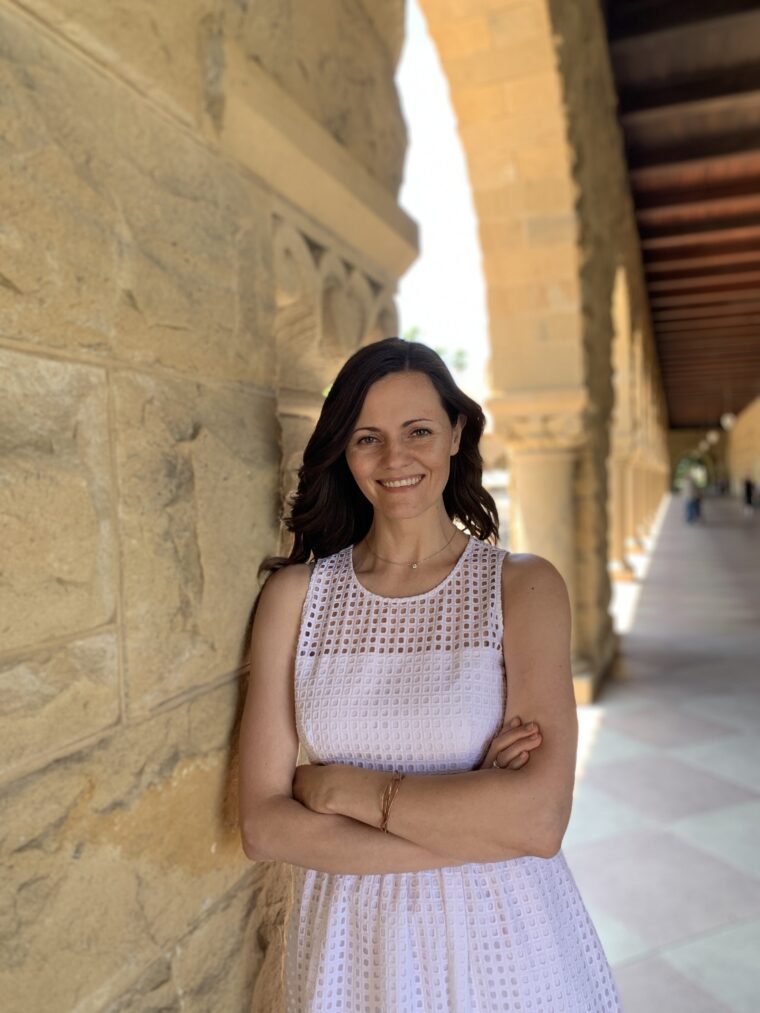Turning 28 is a mixed blessing for a musician. So many music legends died at age 27, there’s a club named for them, the 27 Club. When Brett Anderson turned 28, she was grateful to make that milestone but realized she wasn’t exactly a legend. “I realized I didn’t want to burn hot and flare out early,” she says.
Legend or not, Brett Anderson and her band, The Donnas, were rock stars. They made eight records and travelled the world. At the height of their popularity in the early 2000s, they performed on Saturday Night Live, The Late Show with David Letterman and the main stage at Lollapalooza.
Now, as a master’s student at USC Leonard Davis, Anderson is surprised she found herself pulled in this direction. “I spent basically the first 20 years of my career trying to rebel and go against the grain.”
But after the 2008 recession, the band slowed down, and Anderson found herself with some time on her hands. She took classes at Los Angeles City College and eventually enrolled in the psychology program at Stanford University. There, she took a class in longevity which completely changed her perspective.
“Aging suggests decline and loss,” Anderson says. “Longevity focuses on what it takes to overcome disease and maintain a positive attitude as you get older.” The distinction inspired her to pursue not one, but two graduate degrees. She’s currently working on a Master of Science in Gerontology at USC and a Master of Social Work at UCLA.
Helping students create personalized career paths
Anderson has a specific interest in aging and addiction. She says, “In late onset addiction, people have made it through a whole career and life. And then something happens — pain medication or an adverse event — and they find themselves dealing with a substance use disorder.”
USC Leonard Davis gives Anderson the opportunity to pursue her interests to create a unique career path. It starts with faculty who know how to engage students and provide a sound foundation in gerontology.
One of those faculty is Associate Professor Paul Nash, who impressed Anderson with his ability to connect with the students. “He assesses our level of knowledge, comes down to meet us at that level, then brings us up to the next level. You really get the feeling that you’re being taught by the best,” Anderson says.
Associate Professor Susan Enguídanos, who teaches about end-of-life care, also inspired Anderson. Enguídanos gives her class several assignments that explore death and dying in very personal ways. “These exercises seemed light and easy at first but became very deep as we discussed them as a class,” Anderson says. “It’s amazing when you have a group where everyone is interested in talking about what it means to have a good death.”
Training the next generation of aging scholars
Set in the largest private university in California, USC Leonard Davis is a small school. Anderson says, “It’s warm, accepting and accessible. You can pretty much know everybody if you want to.”
Anderson felt included even before she was admitted. “When I asked if I could bring my mom to an admission event they said, ‘Sure, bring her along!’ They were so nice to her. She had the best time.”
Anderson loves being surrounded by people who feel an urgency about serving the booming aging population. She says, “When I’m out in the world, I feel like people aren’t giving it enough attention. But when I come to school, I see the people who are going to make a difference.”
Anderson knows her classmates will be her colleagues someday. They will be the next generation of aging scholars and will work together to change the future of aging.
Drawing a line between music and gerontology
Looking back on her music career, Anderson sees parallels with her future career path. For example, as a female group in a male dominated industry, The Donnas fought against gender stereotypes. In her future work, Anderson will need to address stereotypes in aging and addiction.
Anderson and The Donnas also pushed boundaries. By writing, producing and performing their own work, the band made a statement that anyone could do rock and roll. With her two master’s degrees, Anderson is poised to rock the status quo in the gerontology world as well.
Music is never far away from Anderson, though. Currently, she has a field placement at the Motion Picture Television Fund. They offer varying levels of care to people who were in the entertainment industry. Anderson says, “Recently, the activities department was considering starting a band and asked if I wanted to be involved. Of course, I said yes to that.”
To learn more about Master’s degree programs at the USC Leonard Davis School of Gerontology, call us at (213) 740-5156.





